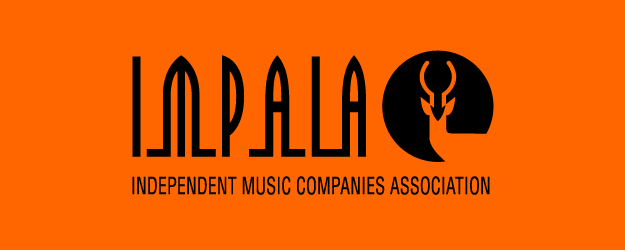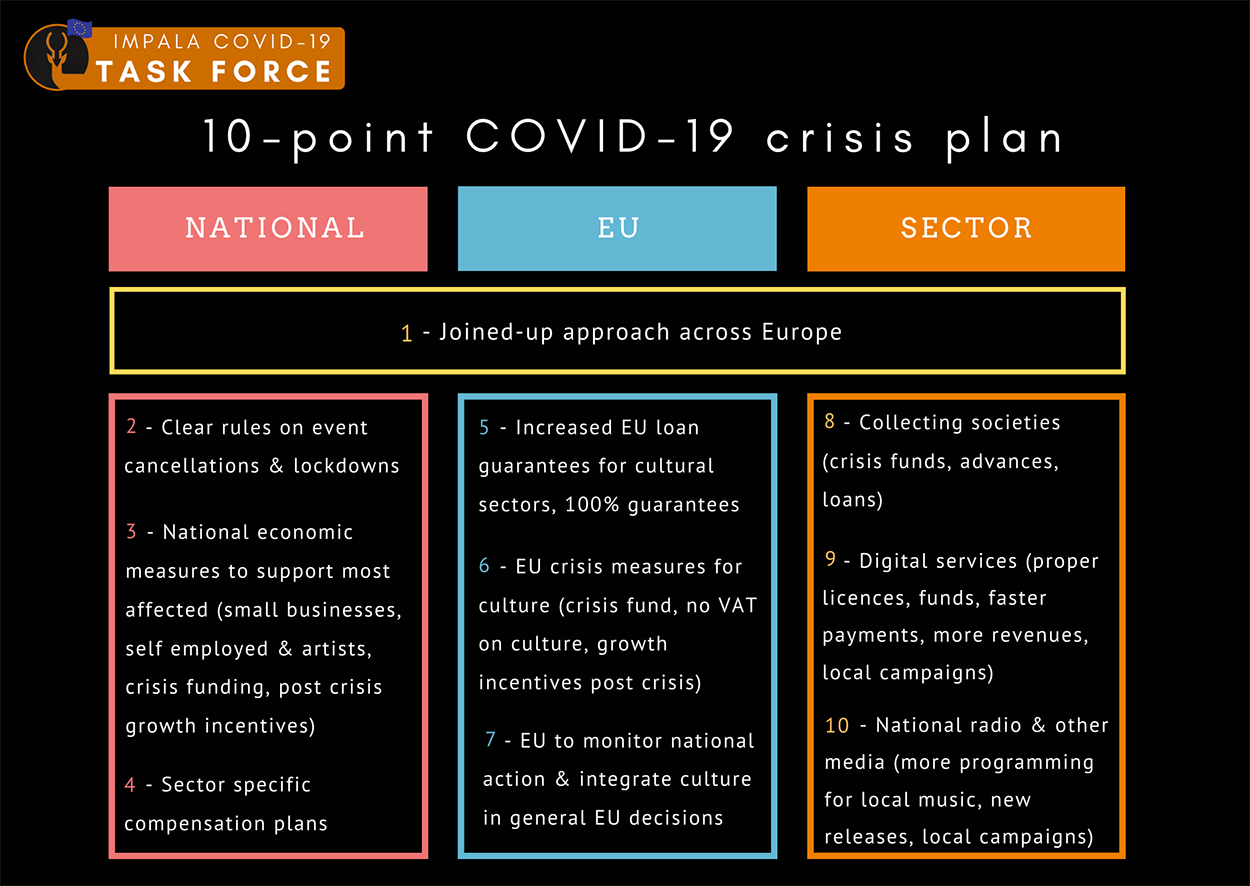This website uses cookies so that we can provide you with the best user experience possible. Cookie information is stored in your browser and performs functions such as recognising you when you return to our website and helping our team to understand which sections of the website you find most interesting and useful.
Business News Industry People Labels & Publishers Top Stories
IMPALA publishes ten point COVID-19 crisis plan
By Chris Cooke | Published on Wednesday 25 March 2020

Pan-European indie label trade group IMPALA has published a ten point crisis plan to help the independent music community across Europe cope with the COVID-19 pandemic. The list of ten recommendations for national governments, European Union institutions and the wider music sector follow the creation last week of an IMPALA taskforce that brings together representatives of independent music businesses from across the continent.
The music industry was immediately hit, of course, as the first social distancing measures were introduced in a bid to combat the virus. Those measures resulted in the live sector firstly curtailing its activities and then – within a few weeks, sometimes days – going into full-on shutdown. As those measures have increased, music retail, physical distribution, studio work and music education have all also been hit, as have music companies that sell services to people and businesses in all those areas.
Alongside its ten recommendations, IMPALA notes that “music was one of the first sectors hit by the crisis”, and that the negative impact is particularly severe because the music industry is made up of “predominantly micro-businesses, self-employed workers and freelancers”. With that in mind IMPALA’s taskforce calls for “a swift and massive response to ensure music and other cultural sectors can weather through the storm”.
It goes on: “The aim is for artists and freelance workers to preserve their livelihood, and for independent companies to stay in business and continue investing. European cultural and creative sectors account for 4.4% of EU GDP and twelve million full-time jobs. Diversity is their strength, but also a vulnerability in times of crises”.
Different European governments have responded to the COVID-19 crisis in different ways and at different speeds. Both in the implementation of measures to restrict and delay the spread of the disease and in the announcement of economic packages to support individuals and businesses negatively impacted by those measures.
With that in mind, IMPALA’s first recommendation is for more coordination and communication between European countries – both directly between governments, via EU institutions, and by reps of each European music industry sharing information about approaches and initiatives that have proven particularly effective.
In its three demands of national governments across Europe, IMPALA
calls for clear unambiguous rules on things like social distancing and
lockdown; comprehensive short-term economic packages to mitigate the
immediate negative impact of the crisis on all individuals and
businesses; and sector specific compensation plans for those industries
particularly hard hit, such as music and the wider creative sector.
The list of proposed economic measures – some of which have already been
announced in some European countries – include a specific focus on the
need for support for freelancers and the self-employed. A significant
number of people working in music do so on a freelance basis which
creates extra problems in countries like the UK where most of the big
economic measures announced so far are focused on those in formal
employment.
IMPALA’s crisis plan then has three specific recommendations for the
European Union, including increased EU loan guarantees for cultural
sectors and the creation of a specific crisis fund for smaller cultural
businesses. It also says that the EU should “monitor national action and
integrate culture in general EU decisions”.
The three recommendations for the wider music sector put the focus on
how collecting societies, digital platforms and music media can provide
support.
With the former, it says that other societies should follow the lead of GEMA in Germany in setting up crisis funds for their members, with the focus on supporting smaller and independent labels, artists, publishers and songwriters. They should also make available advances and interest free loan facilities.
As for the streaming services, they too should “introduce crisis funds for small businesses”, while also “making faster royalty payments, passing over a higher percentage of revenues to rightsholders, providing advances to all rightsholders who need them, boosting local music and artists with playlists, and supporting local social media campaigns”.
There have been increasing calls from other players in the music community for the streaming services to instigate measures to support artists struggling in the face of the COVID-19 crisis, with various different options proposed, some more realistic than others.
Those calls escalated last week after Netflix announced it had set up a $100 million fund to support those in the TV sector who had lost employment after the productions they were working on were put on hold. A lot of that money will go to support those who had been specifically working on productions for Netflix itself, although it will also help fund support for the wider TV production community.
In the US, various digital firms that utilise music – including Amazon, Apple, Spotify, Tidal, YouTube and Pandora/Sirius XM – have put money into the special COVID-19 fund set up by the Recording Academy’s MusiCares charity. Those donations have doubled the size of that fund from $2 million to $4 million. It remains to be seen if similar gestures are now made in other markets around the world.
As for more traditional music media, IMPALA’s final recommendation says that they “should promote local music and artists with increased music programming, put more focus on independent and local artists, and promote new local releases as well as local social media campaigns”.
Launching the ten point crisis plan this morning, IMPALA boss Helen Smith said: “This is a call for urgent action. Small businesses, artists and freelance workers all need support. A joined-up approach across Europe is vital. Incentives for future growth are also part of the plan. No one should get left behind”.
Meanwhile Francesca Trainini, Chair of IMPALA and its COVID-19 taskforce – who is also Vice-President of Italian industry association PMI – added: “To help achieve an effective safety net, the EU should monitor what is happening at national level. We also need to map the results. Italy is just one example where the music sector is crumbling”.
You can read the full crisis plan here:






